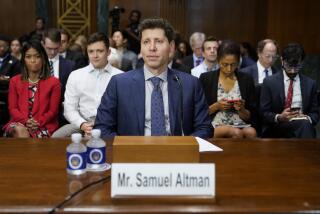Loosen Exports of Technology, Packard Says
- Share via
WASHINGTON — The United States and its allies should take immediate steps to loosen restrictions on high-technology exports to former Soviet bloc countries that are battling to rebuild their economies, according to Rep. Ron Packard (R-Carlsbad).
Packard made the remarks in a weekend interview shortly after returning from a two-week official visit to East Germany, Poland, Czechoslovakia, Hungary and Yugoslavia. He made the trip with a dozen other members of Congress.
Led by Rep. John J. LaFalce (D-N.Y.), chairman of the House Committee on Small Business, the bipartisan group was the first large Congressional delegation to tour Eastern Europe since its hard-line Communist governments began falling last year.
Packard, whose district includes southern Orange County, was invited because of his membership on the House Committee on Science, Space and Technology, he said.
“There’s a total commitment in all of the countries we visited . . . to move to a market system, to a free-market economy,” Packard said.
“That presents a lot of problems,” he continued. “They’re craving and longing for joint ventures with Western business and an infusion of venture capital. . . . (But) all property, all industry, all buildings are state-owned, and how can you have joint ventures without private ownership?”
Leaders of Eastern European nations are working hard to find a way to transfer ownership from the state to private parties, he said.
More than foreign aid money, the newly created governments need the advice and expertise of seasoned capitalists, Packard said. And they especially need access to advanced technology in such fields as agriculture and telecommunications to spur private investment from abroad.
Leaders in Poland and other countries asked for Congressional help in easing trade restrictions imposed both by the United States and the international Coordinating Committee on Multilateral Export Controls. The United States is the dominant member of the 17-nation, Paris-based organization, which sets restrictions on the export of sophisticated technology to the East Bloc and the People’s Republic of China.
“They want that relaxed, and frankly, I think it needs to be relaxed,” Packard said of the restrictions, “because we can’t even ship telephones to them, we can’t ship them second-hand computers. . . . The end result is, they cannot get technology.”
Some members of the Bush Administration have indicated a willingness to relax trade restrictions, particularly involving the sale of computers and telecommunications equipment to Poland and Hungary. But it is not clear how far the Administration is willing to go.
For example, Secretary of Defense Dick Cheney last year protested a Commerce Department decision to lift restrictions on the sale of certain personal computers to the Soviet Union. He later changed his mind. But his initial opposition indicated the sensitivity of the Defense Department to trade restriction issues.
Packard said he will work with members of the House technology committee as well as the Department of Commerce to ease trade barriers. Economic conditions in former East Bloc countries will get worse before they get better, Packard said.
“They’re going to make it,” he said. “But they’re going to hurt badly in the meantime. The question is whether the people themselves will be able to last long enough, whether their passion for the free-market system will last long enough for them to see daylight.”
Packard said he returned from the visit persuaded that the reunification of East and West Germany is a certainty.
“There is no question, those were the words that they (East and West German leaders) used, ‘There’s no question that we’re going to unify,’ ” Packard said.
More to Read
Inside the business of entertainment
The Wide Shot brings you news, analysis and insights on everything from streaming wars to production — and what it all means for the future.
You may occasionally receive promotional content from the Los Angeles Times.










